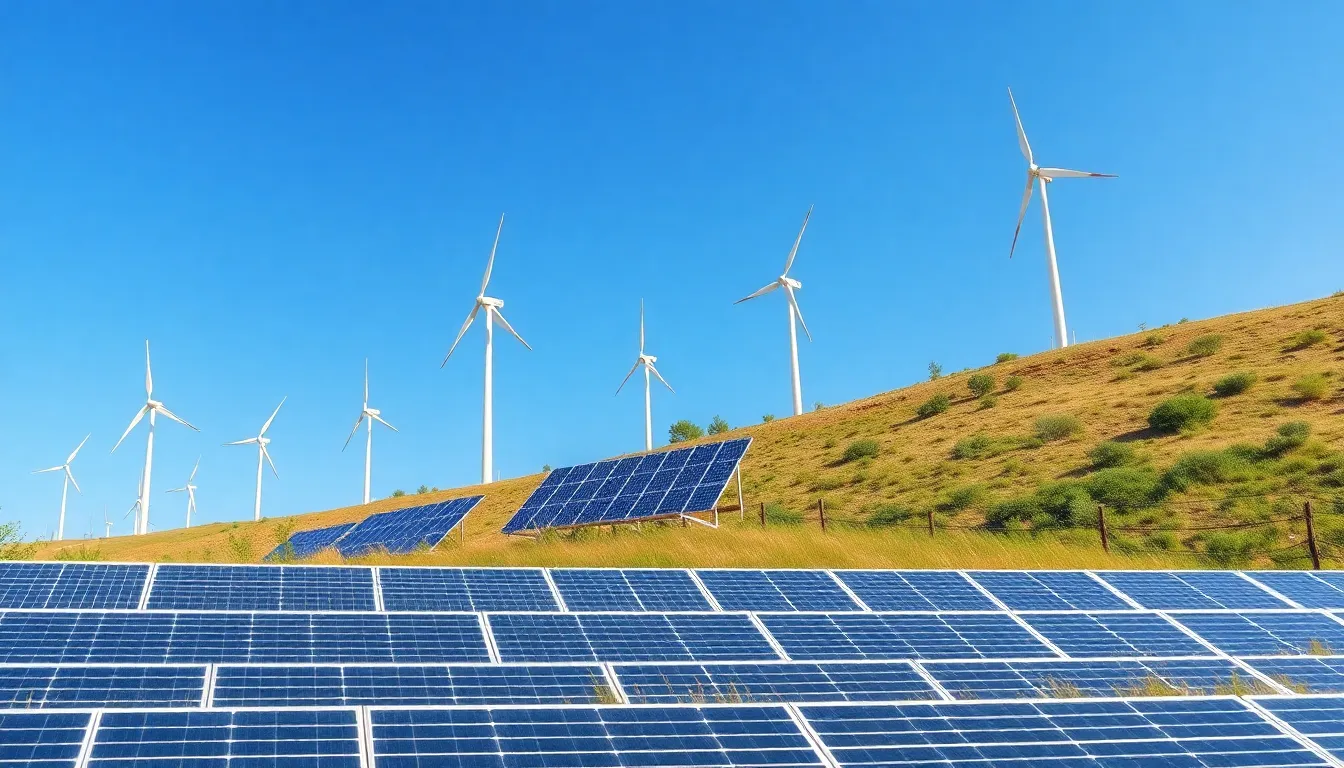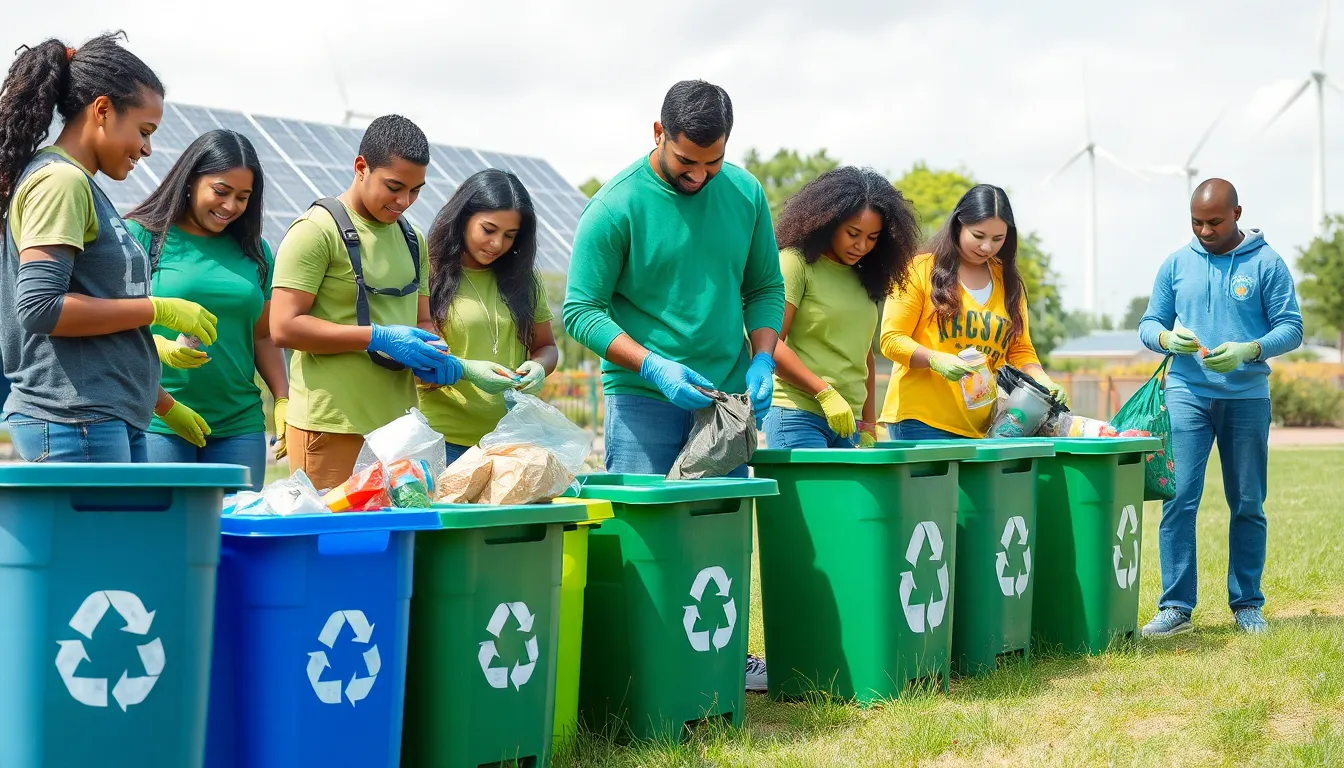In a world grappling with climate change and resource depletion, sustainable tech solutions are emerging as vital players in the quest for a greener future. These innovations not only address pressing environmental issues but also enhance efficiency and drive economic growth. From renewable energy sources to smart waste management systems, technology is paving the way for a more sustainable lifestyle.
As businesses and consumers alike become more eco-conscious, the demand for sustainable solutions is skyrocketing. Companies are increasingly adopting green technologies to reduce their carbon footprints while maximizing productivity. This shift not only benefits the planet but also positions organizations as leaders in the evolving market. Embracing sustainable tech is no longer just a trend—it’s a necessity for a thriving, responsible future.
Table of Contents
ToggleOverview of Sustainable Tech Solutions
Sustainable tech solutions encompass innovations designed to minimize environmental impact while addressing modern challenges. These technologies focus on preserving natural resources, reducing waste, and enhancing efficiency across various sectors.
Key Areas of Sustainable Tech Solutions
- Renewable Energy Sources
- Solar power systems generate electricity to reduce reliance on fossil fuels.
- Wind turbines convert wind energy into electric power, providing clean alternatives.
- Hydro energy uses flowing water to produce sustainable electricity.
- Smart Waste Management
- Recycling technologies streamline the process of converting waste into reusable materials.
- Composting solutions transform organic waste into valuable fertilizer, enriching soil health.
- Waste-to-energy plants generate energy by converting non-recyclable waste materials.
- Energy-Efficient Solutions
- LED lighting consumes significantly less energy than traditional bulbs while delivering comparable luminosity.
- Smart thermostats adjust heating and cooling based on usage patterns, optimizing energy consumption.
- High-efficiency appliances minimize water and energy use, promoting sustainability in households.
- Sustainable Agriculture
- Precision farming uses technology to monitor soil health and optimize resource use.
- Vertical farming enables year-round crop production with minimal land use.
- Organic farming practices enhance biodiversity and soil health, reducing chemical dependency.
- Green Transportation
- Electric vehicles reduce greenhouse gas emissions and improve air quality.
- Public transportation systems lower individual carbon footprints by encouraging shared travel.
- Bicycle-sharing programs promote active, eco-friendly commuting options.
Embracing these sustainable tech solutions positions businesses and individuals to contribute to a more sustainable future, aligning with global efforts to combat climate change and promote resource conservation.
Key Technologies in Sustainable Tech

Sustainable tech solutions increasingly rely on innovative technologies that promote environmental preservation and resource efficiency. Key technologies include renewable energy innovations and advanced waste management practices.
Renewable Energy Innovations
Renewable energy innovations significantly advance the transition from fossil fuels. Solar power systems, including photovoltaic panels and solar thermal technologies, harness sunlight to produce electricity and heat. Wind turbines capture wind energy, generating clean electricity, while hydropower systems utilize flowing water to create energy. Battery storage technologies enhance the integration of these renewable sources by storing surplus energy for later use. Geothermal systems tap into the Earth’s internal heat, providing a consistent energy supply. The implementation of microgrid solutions allows communities to generate and manage their own renewable energy, increasing resilience and reducing reliance on centralized power sources.
Waste Management Technologies
Waste management technologies focus on minimizing waste and optimizing resource recovery. Smart waste sorting systems employ AI and machine learning to improve recycling processes, ensuring higher purity levels in recovered materials. Advanced composting methods, utilizing in-vessel composters, accelerate organic waste breakdown, producing valuable compost for soil enhancement. Waste-to-energy technologies convert non-recyclable materials into energy through anaerobic digestion or incineration, contributing to circular economy efforts. Digital platforms facilitate efficient waste tracking and management for organizations, promoting accountability and reducing landfill contributions. Through these innovations, waste management systems transform waste into valuable resources, fostering sustainability.
Benefits of Sustainable Tech Solutions
Sustainable tech solutions offer significant advantages, primarily in environmental impact and economic benefits. These solutions play a vital role in creating a more sustainable future.
Environmental Impact
Sustainable tech solutions directly mitigate environmental challenges. They reduce greenhouse gas emissions by incorporating renewable energy sources, like solar and wind power. These technologies help decrease reliance on fossil fuels, which is critical for reducing air pollution and combating climate change. Smart waste management practices contribute to minimizing waste sent to landfills. Recycling and composting processes enhance resource recovery, turning waste into valuable materials. Moreover, energy-efficient solutions optimize energy use, leading to lower overall consumption. As these practices gain traction, ecosystems benefit from improved biodiversity and healthier environments.
Economic Advantages
Sustainable tech solutions generate notable economic advantages. They lower operational costs through increased energy efficiency and resource optimization. For instance, companies adopting energy-efficient lighting and HVAC systems often see reductions in utility bills of 20-30%. The growing demand for green technologies also creates job opportunities in innovative sectors, such as renewable energy and waste management. Investing in sustainable practices improves brand reputation, attracting consumers who prioritize eco-friendly products and services. Furthermore, government incentives for adopting sustainable technologies can lead to financial support, making such investments more appealing.
Challenges in Implementing Sustainable Tech Solutions
Implementing sustainable tech solutions presents several challenges that organizations must navigate. These include technical barriers and financial considerations that can hinder adoption.
Technical Barriers
Technical barriers encompass various issues related to technology integration, infrastructure compatibility, and knowledge gaps. Organizations often face difficulties when aligning existing systems with new sustainable technologies. For instance, integrating renewable energy sources like solar and wind can require significant upgrades to infrastructure, including grid modernization. Lack of expertise in advanced technologies can impede effective deployment as well since staff training is crucial for operation and maintenance. Additionally, the evolving nature of sustainable technologies can result in rapidly shifting standards, making it challenging to keep pace with innovations.
Financial Considerations
Financial considerations represent a critical hurdle in the adoption of sustainable tech solutions. Initial investments in green technologies often exceed conventional options, which may deter organizations from making the switch. While long-term savings typically outweigh upfront costs, the immediate financial burden can be substantial. Furthermore, access to financing options can vary significantly, with smaller companies often struggling to secure funding for sustainable projects. Compounding these issues, fluctuations in government policies and incentives can impact the financial landscape, creating uncertainty in return on investment calculations.
Future Trends in Sustainable Tech Solutions
The future of sustainable tech solutions hinges on several emerging trends that redefine how industries approach environmental responsibility.
- Decentralized Energy Systems
Decentralized energy systems, including microgrids and peer-to-peer energy trading, empower communities to produce and manage their own energy. These systems increase resilience and offer flexibility in energy sourcing, enabling greater reliance on renewables.
- Circular Economy Practices
Circular economy practices promote the reuse and recycling of materials, reducing waste and conserving resources. Innovative product design focuses on longevity and reparability. Companies increasingly adopt take-back programs to ensure that products return to the supply chain for future use.
- Green Software Development
Green software development prioritizes energy efficiency in coding and software usage. Developers use tools to assess energy consumption and carbon emissions associated with software products, enabling them to create applications that consume less energy during operation.
- Electric and Autonomous Vehicles
Electric vehicle (EV) adoption continues to rise, driven by declining battery costs and technological advancements. Autonomous vehicles are set to enhance transportation efficiency, reduce emissions, and optimize route planning through intelligent data systems.
- Smart Agriculture Technologies
Smart agriculture technologies utilize IoT and AI for resource management in farming. These solutions monitor soil conditions and optimize water usage, thus improving crop yields while minimizing environmental impact.
- Regenerative Practices in Business
Regenerative practices shift the focus from sustainability to enhancing ecosystems and communities. Companies implement strategies that restore natural resources and contribute to local biodiversity, creating a holistic approach to environmental stewardship.
- Blockchain for Sustainability
Blockchain technology provides transparency in supply chains, enabling organizations to track resource provenance and eco-friendly practices. This traceability fosters trust among consumers, ensuring they support responsible brands.
- Waste-to-Energy Innovations
Waste-to-energy innovations transform waste materials into usable energy, addressing disposal challenges while producing power. Technologies like anaerobic digestion and gasification play an essential role in minimizing landfill impact.
- Advancements in Energy Storage
Energy storage advancements, particularly in battery technologies, greatly enhance the reliability of renewable energy sources. Improved storage solutions allow for better energy management and integration, supporting a more sustainable energy grid.
- Collaboration and Partnerships
Collaboration across sectors accelerates the development and deployment of sustainable technologies. Partnerships among governments, businesses, and research institutions foster innovation, funding, and shared knowledge aimed at addressing sustainability challenges.
As these trends advance, sustainable tech solutions gain traction, shaping a responsible future for industries and consumers alike.
Sustainable tech solutions are not just a trend; they’re a necessity for a thriving future. As businesses and consumers increasingly prioritize eco-friendly practices, the integration of renewable energy and smart waste management becomes crucial. These innovations not only combat climate change but also offer economic advantages that drive growth.
The challenges in adopting these technologies shouldn’t deter organizations from making the switch. With ongoing advancements and supportive policies, the path to sustainability is becoming clearer. By embracing these solutions, industries can lead the charge toward a greener, more responsible world. The future is bright for those who invest in sustainable technology, ensuring a healthier planet for generations to come.

